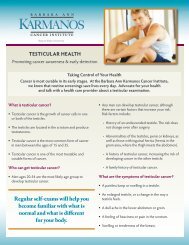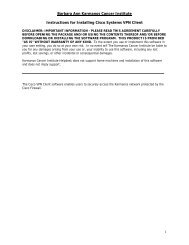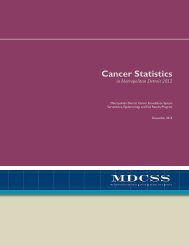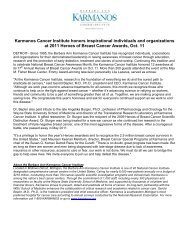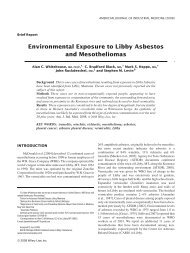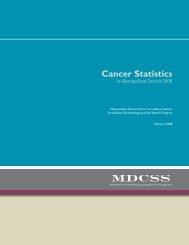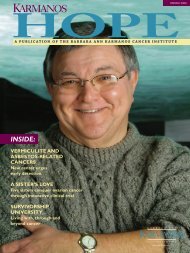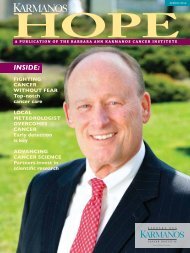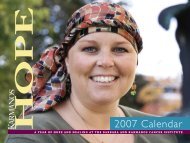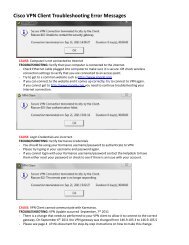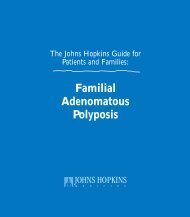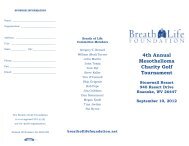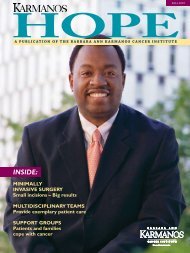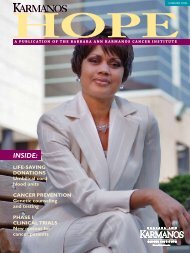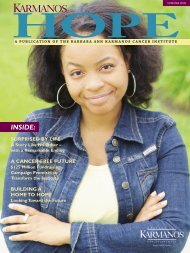Fall 2010 - Karmanos Cancer Institute
Fall 2010 - Karmanos Cancer Institute
Fall 2010 - Karmanos Cancer Institute
You also want an ePaper? Increase the reach of your titles
YUMPU automatically turns print PDFs into web optimized ePapers that Google loves.
HOPEFALL <strong>2010</strong><br />
A P U B L I C AT I O N O F T H E B A R B A R A A N N K A R M A N O S C A N C E R I N S T I T U T E<br />
INSIDE:<br />
CLINICAL TRIALS<br />
More treatment<br />
options for patients<br />
ASK THE DOCTOR<br />
Physicians answer<br />
questions about<br />
cancer risks<br />
COMPASSIONATE<br />
CARE<br />
<strong>Karmanos</strong> helps<br />
patients and<br />
families cope
PRESIDENT’S LETTER<br />
Dear Friends,<br />
A few months ago we made an interesting observation about what people think.<br />
After researching consumer thoughts and opinions, we learned that non-<strong>Karmanos</strong><br />
patients do not fully understand what it means to be the only hospital in Michigan<br />
dedicated exclusively to beating cancer.<br />
On the other hand, <strong>Karmanos</strong> patients knew exactly how significant it is to be<br />
treated at our cancer hospital. They knew the difference between a cancer wing or<br />
a cancer center within a community hospital, and <strong>Karmanos</strong>, a National <strong>Cancer</strong><br />
<strong>Institute</strong>-designated comprehensive cancer center, where all we do is fight cancer.<br />
And they knew that at <strong>Karmanos</strong> our physicians are cancer specialists, not<br />
generalists, who are laser-focused on a particular type of cancer.<br />
There are many reasons why <strong>Karmanos</strong> is known for world-class cancer care.<br />
For people like Lillie Manns, who’s fighting breast cancer for the third time, it’s<br />
because <strong>Karmanos</strong> has access to 130 cancer treatments that no other local hospital<br />
has. You can read about her cancer journey and other stories of hope and survival<br />
in this issue of <strong>Karmanos</strong> Hope.<br />
Does it make a difference where you go for cancer care? Without a doubt.<br />
Gerold Bepler, M.D., Ph.D.<br />
President & Chief Executive Officer<br />
John C. Ruckdeschel, M.D.<br />
ON THE COVER<br />
PRESIDENT AND CHIEF EXECUTIVE OFFICER<br />
Shelby Township resident Cassie Hines,<br />
BARBARA ANN KARMANOS CANCER INSTITUTE<br />
19, knows first-hand that cancer presents<br />
particular challenges for teenagers. But<br />
thanks to a remarkable attitude, a loving<br />
family and support from her <strong>Karmanos</strong><br />
team, she’s doing well and pursuing a<br />
degree in speech pathology.<br />
Read her inspirational story on page 2.<br />
Cover image by Stephen Lengnick, Plum Street Studio<br />
...................................................<br />
FALL <strong>2010</strong><br />
VOLUME 6 | NUMBER 2<br />
...................................................<br />
ABOUT KARMANOS<br />
The Barbara Ann <strong>Karmanos</strong> <strong>Cancer</strong> <strong>Institute</strong><br />
is one of only 40 National <strong>Cancer</strong><br />
<strong>Institute</strong>-designated comprehensive cancer<br />
centers in the United States. Federal designation<br />
as a comprehensive cancer center is the<br />
pinnacle of translational oncology research.<br />
...................................................<br />
EXECUTIVE STAFF<br />
GEROLD BEPLER, M.D., Ph.D.<br />
President and Chief Executive Officer<br />
ANN G. SCHWARTz, PH.D., MPH<br />
Executive Vice President/Deputy Director<br />
GEORGE YOO, M.D., FACS<br />
Chief Medical Officer<br />
GARY MORRISON<br />
Chief Operating Officer<br />
GARY zMRHAL<br />
Interim Chief Financial Officer<br />
NICK KARMANOS<br />
Vice President, Development<br />
...................................................<br />
KARMANOS CANCER INSTITUTE<br />
BOARD OF DIRECTORS<br />
Alan S. Schwartz, Chair<br />
Eleanor M. Josaitis<br />
Randolph J. Agley, Vice Chair<br />
Peter <strong>Karmanos</strong>, Jr.<br />
Charles E. Becker, Lead Vice Chair<br />
C. Michael Kojaian<br />
Richard M. Gabrys, Vice Chair<br />
Edward C. Levy, Jr.<br />
W. James Prowse, Vice Chair<br />
Mary Matuja<br />
Jonathan S. Aaron<br />
Timothy Monahan<br />
Eugene Applebaum<br />
Paul L. Nine<br />
Gerold Bepler, M.D., Ph.D. (ex officio)<br />
Thomas D. Ogden<br />
Paul Borman<br />
Fred D. Olson<br />
Armando R. Cavazos<br />
Valerie M. Parisi, M.D. (ex officio)<br />
Stephen D’Arcy (ex officio)<br />
Dick Purtan<br />
Debbie Dingell<br />
Hilary Ratner, Ph.D.<br />
Joseph Dresner<br />
Eunice Ring<br />
David W. Drews<br />
Richard F. Roth<br />
Michael E. Duggan<br />
Gary Sakwa<br />
Lillian Erdeljan<br />
Nazli G. Sater<br />
Michael Ferrantino, Jr.<br />
Marc R. Schechter<br />
Nathan Forbes<br />
Nettie H. Seabrooks<br />
Stanley Frankel<br />
Nedda N. Shayota<br />
Myron Frasier<br />
Robert A. Stone<br />
Bruce A. Gershenson<br />
David Trott<br />
Adnan Hammad, Ph.D.<br />
Vainutis K. Vaitkevicius, M.D.<br />
Patricia Hartmann<br />
Nancy Yaw<br />
David Jacob<br />
Thank you to outgoing member Jay Noren, M.D.<br />
KARMANOS CANCER CENTER<br />
BOARD OF DIRECTORS<br />
Charles E. Becker, Chair Valerie M. Parisi, M.D. (ex officio)<br />
Timothy Monahan, Vice Chair Phillip A. Phillip, M.D., Ph.D. (ex officio)<br />
Gerold Bepler, M.D., Ph.D. (ex officio)<br />
W. James Prowse<br />
Leslie C. Bowman<br />
Anthony J. Rusciano<br />
Armando R. Cavazos<br />
Alan S. Schwartz (ex officio)<br />
Kenneth Eisenberg<br />
Nettie H. Seabrooks<br />
Myron Frasier<br />
Maureen L. Stapleton<br />
Thomas A. Goss<br />
Jane R. Thomas, Ph.D.<br />
S. Scott Hunter<br />
Manuel Valdivieso, M.D.<br />
Denise Ilitch<br />
George Yoo, M.D. (ex officio)<br />
Thank you to outgoing member Antoinette J. Wozniak, M.D.<br />
(as of 9/1/10)
04<br />
10<br />
14<br />
28<br />
CONTENTS<br />
02 FEATURES<br />
LIVING LIFE TO THE FULLEST<br />
Supportive Services Help Patients and<br />
Families Cope with the Disease<br />
NEw DRUGS FOR BETTER OUTCOMES<br />
Clinical Trials Give <strong>Cancer</strong> Patients More Treatment Options<br />
TACKLING THE TOXIN EPIDEMIC<br />
<strong>Karmanos</strong> Offers Hope to Patients<br />
Exposed to Environmental Agents<br />
PRECISE TUMOR TREATMENT<br />
New Image-Guided Equipment<br />
Delivers Radiation with High Accuracy<br />
ASK THE DOCTOR<br />
Our Physicians Answer Commonly Asked <strong>Cancer</strong>-related Questions<br />
14 COMPASSIONATE CARE<br />
A SURVIVOR’S STORy<br />
Skin <strong>Cancer</strong> Patient Chooses <strong>Karmanos</strong> for its Compassionate Care<br />
REASON TO HOPE<br />
Pancreatic <strong>Cancer</strong> Survivor Relies on <strong>Karmanos</strong> Surgeon’s Expertise<br />
17 AT KARMANOS<br />
INVENTING BETTER TECHNOLOGy<br />
<strong>Karmanos</strong> Develops a New Breast <strong>Cancer</strong> Imaging Device<br />
UP CLOSE<br />
Gary Morrison, FACHE, Chief Operating Officer<br />
A DAILy DOSE OF EXCELLENCE<br />
<strong>Karmanos</strong> Nurses Continue to Earn Prestigious Honors<br />
FIRST STEPS INTO THE wORKING wORLD<br />
Medical staff talks about first jobs<br />
CAMBRIDGE CONTRIBUTIONS<br />
Local Company Makes a Difference in Patients’ Lives<br />
FIGHTING CANCER wHILE MEETING<br />
RETIREMENT AND ESTATE PLANNING NEEDS<br />
Loved One’s “Attitude of Charity” Inspires Legacy Gift<br />
26 AROUND TOwN<br />
28 EXTENDING A wARM wELCOME<br />
Generous Donor Gift Provides Main Lobby Renovations<br />
29 wHy KARMANOS? TOP 10 REASONS
HOPE | FEATURE<br />
Living Life<br />
CASSIE AND KAREN HINES<br />
2 | HOPE<br />
TO THE FULLEST<br />
Supportive Services Help Patients and Families Cope with the Disease
All cancer patients deal with different stressors as<br />
they undergo treatment. But cancer can present a particular<br />
set of burdens for teenage patients. They may not be able<br />
to attend school, have a job or enjoy as many social<br />
activities with their friends. The disease can also disrupt<br />
their dating lives or interfere with their need to become<br />
more independent.<br />
Cassie Hines, a 19-year-old metastatic renal cancer patient<br />
from Shelby Township, can identify with some of these<br />
challenges. With the help of Kathleen Hardy, LMSW, an<br />
oncology social worker at the <strong>Karmanos</strong> <strong>Cancer</strong> Center,<br />
Hines and her family are learning some valuable coping skills.<br />
“Dealing with cancer can be a struggle,” Hines says.<br />
“Your friends may not always understand what you’re<br />
going through. At times I felt like I had lost control.<br />
But Kathleen has helped me a lot. <strong>Cancer</strong> isn’t as much<br />
of a burden as I thought it would be.”<br />
Hines was just 17 when doctors first diagnosed her with<br />
kidney cancer. Surgeons removed a grapefruit-sized tumor<br />
from her kidney, but the cancer returned three months later<br />
in her pelvic area. She then had a pelvic resection, a hip<br />
replacement and a long recovery. She spent several months<br />
relearning how to walk.<br />
Just as Hines was making progress, the cancer returned<br />
again in her kidney, liver, vertebrae and several other<br />
locations. At that point, Hines and her family decided to<br />
seek treatment from the oncology specialists at <strong>Karmanos</strong>.<br />
Under the care of <strong>Karmanos</strong>’ Ulka Vaishampayan, M.D.,<br />
multidisciplinary team leader of Genitourinary Oncology,<br />
and Peter Littrup, M.D., medical director of Interventional<br />
Oncology and director of Radiology Research and the<br />
Human Imaging Core, Hines has had a combination of<br />
chemotherapy, cryotherapy and drug therapy. She and her<br />
family also began meeting with Hardy.<br />
“Oncology social workers provide counseling support<br />
for patients and family members as they’re dealing with<br />
cancer diagnosis, treatment or other long-term issues<br />
related to the disease,” Hardy says. “<strong>Cancer</strong> doesn’t just<br />
affect one person, it affects the entire family. It also<br />
affects each patient and family differently, so we provide<br />
a customized level of support to meet their needs.”<br />
Hardy helped Hines overcome some of her anxieties<br />
before Hardy met with her siblings and parents.<br />
“<strong>Cancer</strong> began to<br />
wear on my family,”<br />
Hines says. “My<br />
brother and sister<br />
were very quiet<br />
around the house<br />
and didn’t talk<br />
with me as much.<br />
Kathleen helped<br />
us learn how to<br />
communicate better.<br />
I also had to leave<br />
college for treatment.<br />
Living at<br />
home again after<br />
being independent<br />
was hard at first<br />
but I’ve learned to<br />
rely on others for<br />
support.”<br />
HOPE | FEATURE<br />
KATHLEEN HARDy, LMSw<br />
Hardy also<br />
connected Hines with Camp Make-A-Dream, which<br />
offers medically-supervised, cost-free camps to children,<br />
young adults and families affected by cancer. Hines<br />
attended a week-long teen camp last June at a picturesque,<br />
mountainside setting in Gold Creek, Mont.<br />
“It was nice to get away from all the treatments and<br />
hang out with other people my age who are having similar<br />
experiences,” Hines says. “I’m still in touch with the friends<br />
I made at camp.”<br />
Hines recently resumed classes this summer at Macomb<br />
Community College and plans on completing her degree<br />
in speech pathology at Michigan State University.<br />
“Cassie is a remarkably inspirational person,” Hardy says.<br />
“At first, she felt she could manage her disease by herself.<br />
But once Cassie realized that her condition is chronic, she<br />
became much more open. Now she asks for what she wants<br />
and needs. She’s learned that you don’t have to deal with<br />
cancer alone.”<br />
For more information about supportive oncology services<br />
and programs, visit <strong>Karmanos</strong>.org or call<br />
1-800-KARMANOS (1-800-527-6266).<br />
HOPE | 3
HOPE | FEATURE<br />
NEW DRUGS<br />
Clinical Trials Give <strong>Cancer</strong> Patients More Treatment Options<br />
4 | HOPE<br />
for Better Outcomes<br />
To say that Lillie Manns is an upbeat person is an<br />
understatement. Although she’s still receiving treatment for<br />
breast cancer five years after her initial diagnosis, she faces<br />
her foe with great courage and tenacity.<br />
“I’ve beaten breast cancer twice already,” says Manns, a<br />
71-year-old retiree from Southfield. “It came back a third<br />
time, but I’ve never allowed it to get to me. From the very<br />
beginning, I’ve felt cancer is something I can overcome.<br />
And the care I’m receiving at <strong>Karmanos</strong> makes me want<br />
to fight the disease even more.”<br />
Manns’ partner in her battle against cancer is Patricia<br />
LoRusso, D.O., director of the Phase I Clinical Trials<br />
Program at the <strong>Karmanos</strong> <strong>Cancer</strong> Center. Dr. LoRusso<br />
and her team are developing better ways to treat cancer<br />
patients by evaluating the effectiveness of how new<br />
cancer-fighting drugs affect humans. Patients usually<br />
enter the program after conventional treatment has failed<br />
or when effective treatment is no longer possible.<br />
“The oncologist I had been seeing didn’t feel that chemotherapy<br />
was working for me, so he referred me to <strong>Karmanos</strong>,”<br />
Manns says. “Once I met Dr. LoRusso, I immediately felt<br />
reassured. With my faith and Dr. LoRusso’s help, there’s<br />
no way cancer will take control of me.”<br />
AMONG THE wORLD’S BEST<br />
Through its Clinical Trials program, <strong>Karmanos</strong> offers about<br />
130 investigational drugs that are in various stages of clinical<br />
development and are not commercially available. Its Phase I<br />
program is one of just 14 National <strong>Cancer</strong> <strong>Institute</strong>-funded<br />
programs in the U.S. and Canada, and the only such<br />
program in Michigan. “Under the leadership of Dr.<br />
LoRusso, <strong>Karmanos</strong>’ Phase I program has become one of<br />
the best in the world,” says Gerold Bepler, M.D., Ph.D.,<br />
<strong>Karmanos</strong> president and chief executive officer.<br />
“We offer newly-developed drugs that simply cannot be<br />
obtained at regional medical centers,” Dr. Bepler says. “Dr.<br />
LoRusso is also a recognized leader in her field. She is on<br />
multiple National <strong>Cancer</strong> <strong>Institute</strong> panels and pharmaceutical<br />
companies regularly seek her for consultations. We also<br />
have a highly-skilled research team that can match patients<br />
to a particular clinical trial that will work best for them.”<br />
Although all clinical trials have an experimental component,<br />
patient care and safety are the top priority. The Food and<br />
Drug Administration (FDA) must approve a trial before<br />
patients are enrolled. If a study shows that a particular drug<br />
is safe and effective, the FDA may eventually approve it for<br />
commercial use. With the advent of more targeted drugs<br />
against select tumor targets, there is excitement among<br />
researchers that a new era of drug development could bring<br />
increasingly better patient response rates.<br />
“I tell all my patients that the drugs are investigational, but<br />
the treatment protocol has been thoroughly evaluated by<br />
the FDA,” Dr. LoRusso says. “We monitor our patients<br />
very closely for safety. We may not know how a particular<br />
patient will respond to the drug or what the side effects will<br />
be, but, depending on the tumor, the response may be better<br />
Continued on page 7
LILLIE MANNS<br />
HOPE | FEATURE
HOPE | FEATURE<br />
6 | HOPE<br />
Recruiting patients to trials helps researchers translate<br />
the science from the lab into a clinical setting where it<br />
can make the most impact: on humans!<br />
– PATRICIA LORUSSO, D.O.<br />
Photo by Gregg W. Hettel
Continued from page 4<br />
than with conventional drugs, particularly if that patient has<br />
already failed several treatments.”<br />
Because of the breadth of drugs available, <strong>Karmanos</strong>’<br />
Phase I program is a valuable resource for patients locally<br />
and throughout the country. At any one time, about<br />
100 patients are enrolled in Phase I trials at <strong>Karmanos</strong>. The<br />
majority of these patients come from 50 miles away<br />
or farther for treatment.<br />
Assisting Dr. LoRusso are additional physicians and<br />
a team of experienced personnel. Denise Weiss, FNP,<br />
BC, nurse practitioner within the Phase I Clinical Trials<br />
program, is just one of a team of professionals who guides<br />
cancer patients through the Phase I clinical trials process.<br />
Phase I team members assess patient eligibility to take<br />
part in a specific trial; manage patient case data; provide<br />
patients with trial information; review medical scans; and<br />
follow up with patients regularly while they are on a<br />
clinical trial. Not only that, Phase I team members also<br />
get to know the patients personally.<br />
Weiss, who works primarily with the breast cancer<br />
patients, including Manns, said these women are<br />
inspirational to her.<br />
“They make you realize that what you may have been<br />
worrying about is absolutely nothing compared to the<br />
obstacles that they have to overcome themselves,” she<br />
said. “To see some of these people and see what they<br />
endure, it really wows you.”<br />
HOPE FOR THE FUTURE<br />
Most investigational drugs are not given a name until<br />
just prior to FDA approval. After consulting with Dr.<br />
LoRusso in January 2009, Manns enrolled in a clinical<br />
trial and began taking an investigational chemotherapy<br />
drug called “T-DM1,” which has shown promise for some<br />
breast cancer patients. Recent national and international<br />
HOPE | FEATURE<br />
studies with this drug demonstrate a tumor response rate<br />
of at least 40 percent in patients who have failed many<br />
other treatments, similar to Manns’ situation.<br />
“I wasn’t sure if I wanted to take the drug at first, but<br />
Dr. LoRusso took the time to explain everything to me in<br />
great detail,” Manns says. “I learned that the doctors are<br />
really concerned about their patients and they can stop<br />
the trial at any time. For me, the drug has worked out<br />
well. I feel fine and continue to take it as prescribed. I<br />
see Dr. LoRusso each month and she watches my blood<br />
count very carefully.”<br />
“<strong>Karmanos</strong> has been a great resource for me, because<br />
there’s no other place in the area where I can get this<br />
medication. And it makes me very happy to know that<br />
my trial will help other patients in the future.”<br />
Dr. LoRusso says patients in clinical trials are the true<br />
heroes of her profession. She hopes that more patients<br />
will seek out opportunities to enter a clinical trial and<br />
contribute to the growing body of knowledge that will<br />
eventually end cancer.<br />
“Less than three percent of all cancer patients enter<br />
clinical trials,” Dr. LoRusso says. “It takes a lot of time to<br />
recruit patients and conduct the trials, but it’s the only<br />
way we’re going to make advancements against this disease.<br />
It is critical that we study how these therapies work in<br />
patients in a controlled setting. Recruiting patients to<br />
trials helps researchers translate the science from the lab<br />
into a clinical setting where it can make the most impact:<br />
on humans!”<br />
For more information about the Phase I Clinical Trials<br />
program at <strong>Karmanos</strong>, call (313) 576-8749 or visit<br />
<strong>Karmanos</strong>.org/Phase I.<br />
HOPE | 7
HOPE | FEATURE<br />
Tackling The<br />
Toxin Epidemic<br />
<strong>Karmanos</strong> offers Hope to patients exposed to environmental agents<br />
During his off-hours, Adam Wais often helps<br />
family and friends with home improvement projects.<br />
Last spring, he was remodeling his mother’s bathroom<br />
when he began having trouble breathing.<br />
“I was suddenly short of breath,” says Wais, a 35-year-old<br />
journeyman electrician from Canton. “I had a feeling<br />
something wasn’t right.”<br />
Wais made an appointment with his family doctor,<br />
who diagnosed him with a sinus infection. When the<br />
medication didn’t help, Wais took the next step.<br />
“I’ve suspected for a long time that I’ve been exposed to<br />
concrete dust and asbestos at various job sites,” he says.<br />
ADAM wAIS<br />
8 | HOPE<br />
“I’m a third-generation building tradesman who knows a<br />
thing or two about the dangers of asbestos. I became very<br />
concerned and wanted to take control of the problem, so I<br />
called <strong>Karmanos</strong>.”<br />
Wais visited Michael Harbut, M.D., MPH, FCCP, director<br />
of <strong>Karmanos</strong>’ National Center for Vermiculite and Asbestos-<br />
Related <strong>Cancer</strong>s, and professor of internal medicine at the<br />
Wayne State University School of Medicine. A breathing<br />
test showed that Wais, a non-smoker, was transmitting a<br />
low percentage of oxygen from his lungs to his blood. A<br />
subsequent CT scan revealed scar tissue and an infection in<br />
Wais’ right lung. Dr. Harbut immediately placed Wais on<br />
an appropriate medical regimen.<br />
“Dr. Harbut is keeping a close eye<br />
on my condition,” Wais says. “We<br />
don’t know for sure if it’s asbestosis,<br />
but I feel more confident about<br />
my situation, knowing that I have<br />
an expert to go to for help.”<br />
A GROwING CONCERN<br />
Unfortunately, the number of cancer<br />
patients who have been exposed<br />
to environmental toxins is growing.<br />
Now, the U.S. government is taking<br />
a closer look at the problem.<br />
The President’s <strong>Cancer</strong> Panel<br />
released a report earlier this year<br />
stating that the true burden of<br />
environmentally-induced cancer<br />
has been grossly underestimated.<br />
It also says health care providers<br />
often fail to consider occupational<br />
and environmental factors when<br />
diagnosing their patients.<br />
“People who have been exposed<br />
to environmental toxins often
have difficulty getting an accurate medical diagnosis,” says<br />
Gerold Bepler, M.D., Ph.D., <strong>Karmanos</strong> president and<br />
chief executive officer. “It’s not always clear if a patient’s<br />
problem is related to toxin exposure or another condition.<br />
<strong>Karmanos</strong>’ National Center for Vermiculite and Asbestos-<br />
Related <strong>Cancer</strong>s is a great resource for patients with these<br />
concerns. Dr. Harbut is a nationally recognized physician<br />
who specializes in diagnosing and treating patients with<br />
cancers caused by toxins.”<br />
Dr. Harbut says the report issued by the President’s <strong>Cancer</strong><br />
Panel further confirms his belief that there is a significant<br />
link between environmental toxins and cancer.<br />
“Earlier studies suggested that only about four percent of<br />
cancers were related to environmental toxins,” Dr. Harbut<br />
says. “Today that number is believed to be between 30 and<br />
80 percent. There may be less coal and sulfur dioxide in the<br />
air we breathe today, but there are still other chemicals out<br />
there that contribute to the problem.”<br />
EARLy IDENTIFICATION<br />
Dr. Harbut also says that people with asbestos exposure<br />
have a five to 90 times increased risk of developing lung<br />
cancer, depending on other hazardous exposures in their<br />
life. “By definition, these individuals face a very high cancer<br />
risk,” he added.<br />
To help doctors discover lung tumors at an earlier stage<br />
when more treatment options are available, Dr. Harbut is<br />
developing a new blood test that can help identify mesothelioma<br />
and other deadly cancers that form in the lining<br />
of the chest. He also launched <strong>Karmanos</strong>’ Environmental<br />
<strong>Cancer</strong> Program, in partnership with Blue Cross Blue<br />
Shield of Michigan and the U.S. Centers for Disease<br />
Control.<br />
Labor and management are taking notice. In May, officers<br />
from the International Association of Heat and<br />
Frost Insulators, on behalf of their contractors and the<br />
“Breath of Life Foundation,” presented <strong>Karmanos</strong> with a<br />
$70,000 check to support Dr. Harbut’s ongoing research.<br />
The union also named the National Center for Vermiculite<br />
and Asbestos-Related <strong>Cancer</strong>s a recommended treatment<br />
site for workers in its Central States region, which includes<br />
Michigan, Ohio, Indiana, Kentucky and West Virginia.<br />
“It’s all about finding a cure for mesothelioma, and getting<br />
the word out about early detection of the symptoms for the<br />
disease,” said John Martin, president of the West Virginia<br />
Master Insulators Association and a trustee of the Breath<br />
of Life Foundation.<br />
“Nearly everyone in our union knows someone who has<br />
died from asbestos exposure,” says Heat and Frost Insulators<br />
International Vice President Greg Revard. “Our goal<br />
was to help fund a center that will help our members get<br />
the correct medical diagnosis and proper treatment from<br />
day one. <strong>Karmanos</strong> is a perfect fit for our members. Dr.<br />
Harbut understands the problems we have with asbestos<br />
exposure, and his research is the key that will not only help<br />
workers in our trade, but also help the general public.”<br />
Other <strong>Karmanos</strong> researchers are also dedicated to battling<br />
mesothelioma. Larry Matherly, Ph.D., associate director<br />
of the graduate program in <strong>Cancer</strong> Biology at <strong>Karmanos</strong><br />
and professor in the Department of Pharmacology, Wayne<br />
State University School of Medicine, recently received a<br />
$100,000 grant from the Mesothelioma Applied Research<br />
Foundation to support his work in developing new chemotherapy<br />
drugs that target malignant mesothelioma cells.<br />
To learn more about cancer screening and diagnosis, or to make an<br />
appointment, call 1-800-KARMANOS or visit <strong>Karmanos</strong>.org.<br />
wHAT CAN I DO TO<br />
AVOID EXPOSURE?<br />
HOPE | FEATURE<br />
Dr. Michael Harbut suggests some relatively simple<br />
ways people can reduce their chance of exposure to<br />
environmental toxins in their homes:<br />
ARSENIC: Thousands of southeast Michigan residents<br />
who drink well water are exposed to arsenic. A urine test<br />
can determine if it’s present in your system. Many home<br />
water filters are not able to remove arsenic from drinking<br />
water. To avoid potential exposure, switch from drinking well<br />
water to distilled water.<br />
ASBESTOS: Asbestos has never been banned in the U.S.<br />
and is still used in some products today. Up until the 1970s,<br />
asbestos was a material commonly used in attic insulation<br />
because of its fire-retardant properties. Up to 300,000<br />
homes in southeast Michigan still have insulation containing<br />
asbestos. To avoid exposure, do not disturb attic insulation<br />
– handling the material can cause asbestos to become<br />
airborne. Better yet, do not go into your attic if it has<br />
vermiculite insulation.<br />
RADON: Radon is a naturally occurring gas that can<br />
seep through basement walls. It’s caused by decomposing<br />
uranium in the soil. With a radon test kit, you can find out<br />
if dangerous levels are present in your basement. <strong>Karmanos</strong><br />
is making discounted kits available through a joint venture<br />
with Air Check, Inc., (www.ECPdiscount.radon.com). You can<br />
effectively remove radon from your basement by using<br />
a vented fan or a more sophisticated off-gassing system.<br />
HOPE | 9
HOPE | FEATURE<br />
Precise Tumor<br />
Treatment<br />
NEw IMAGE-GUIDED EqUIPMENT DELIVERS RADIATION wITH HIGH ACCURACy<br />
As part of its goal to provide the highest quality<br />
cancer care, the <strong>Karmanos</strong> <strong>Cancer</strong> Center continually<br />
seeks new and better ways to treat cancer. An important<br />
part of that effort is providing <strong>Karmanos</strong> physicians with<br />
the most advanced medical equipment available.<br />
Within the past year, <strong>Karmanos</strong> took delivery of<br />
state-of-the-art, image-guided radiation therapy machines<br />
with the newest technology available to deliver cancer<br />
10 | HOPE<br />
killing radiation. <strong>Karmanos</strong> physicians can target tumors<br />
with great precision and eliminate or minimize the damage<br />
to healthy surrounding tissue. The new “linear accelerator”<br />
equipment includes two Varian iX machines, available at<br />
<strong>Karmanos</strong>’ main campus in midtown Detroit and at the<br />
<strong>Karmanos</strong> <strong>Cancer</strong> Center in Farmington Hills. Physicians<br />
at the <strong>Karmanos</strong>-Crittenton <strong>Cancer</strong> Center in Rochester<br />
Hills treat patients with Varian’s Trilogy machine.
“The Varian linear accelerators can be used to treat any<br />
type of cancer requiring image guidance,” says Andre<br />
Konski, M.D., MBA, MA, FACR, service chief for<br />
Radiation Oncology at <strong>Karmanos</strong> and chair of the<br />
Department of Radiation Oncology at the Wayne State<br />
University School of Medicine. “The Varian Trilogy<br />
provides very precise treatment for tumors in areas such<br />
as the brain, lungs or abdomen, allowing physicians to treat<br />
patients with stereotactic body radiotherapy. Since both<br />
machines allow us to obtain better images, we can reduce<br />
the margin of normal tissue receiving radiation and deliver<br />
radiation more precisely than ever before.”<br />
Varian iX and Trilogy linear accelerators use X-ray and<br />
cone-beam CAT scan technology to identify exactly where<br />
the treatment volumes are located. The machines also provide<br />
faster treatment through “volumetric arc therapy,” which<br />
delivers radiation in a continuous arc around the patient in<br />
ANDRE KONSKI, M.D., MBA, MA, FACR<br />
Photo by Gregg W. Hettel<br />
HOPE | FEATURE<br />
less than two minutes. Faster treatment helps reduce patient<br />
discomfort and limit potential treatment side effects.<br />
Of course, advanced medical technology is only as good as<br />
those who use it. The <strong>Karmanos</strong> Radiation Oncology Team<br />
is board-certified and actively involved in radiation oncology<br />
education and clinical training, as well as national<br />
efforts to assure safety and accuracy in radiotherapy<br />
delivery. The team worked tirelessly over several months<br />
to calibrate the Varian equipment to perform to the level<br />
of its rigorous standards.<br />
“The Varian equipment replaces earlier technologies and<br />
furthers our ability to target cancer cells,” Dr. Konski says.<br />
“It’s just another tool in our arsenal that gives <strong>Karmanos</strong><br />
patients their best chance at beating cancer.”<br />
For more information about cancer services, call<br />
1-800-KARMANOS or visit <strong>Karmanos</strong>.org.<br />
PATIENT BENEFITS<br />
• More precise targeting helps medical experts deliver enough radiation to<br />
a moving tumor to eliminate it, while minimizing the amount of healthy<br />
tissue exposed to the radiation.<br />
• The ability to provide faster treatment reduces patient discomfort.<br />
CANCERS TREATED<br />
• The Varian iX and Varian Trilogy can be used on any cancer disease site<br />
treated with radiation therapy.<br />
KARMANOS RADIATION ONCOLOGy TEAM<br />
• Leaders in education and clinical training in radiation oncology.<br />
• Actively involved in national efforts to assure safety and accuracy in<br />
radiotherapy delivery.<br />
• Passed all of the criteria for the credentialing process for national<br />
cooperative clinical trials from the Radiological Physics Center, an<br />
organization sponsored by the National <strong>Cancer</strong> <strong>Institute</strong> to monitor<br />
consistency in radiotherapy delivery.<br />
HOPE | 11
HOPE | FEATURE<br />
12 | HOPE<br />
Q & A<br />
Ask the Doctor<br />
<strong>Karmanos</strong> <strong>Cancer</strong> Center physicians answer<br />
commonly asked questions about potential cancer risks.<br />
Q: I’ve heard a lot about a possible link between cell phones and<br />
cancer. Some studies say cell phones can cause tumors; others<br />
say they do not. How do I know what to believe?<br />
A<br />
“Studies that have made a link between cell phones and brain cancer have<br />
been inherently flawed in their design. In contrast, the studies that have had<br />
the largest patient samples and the longest follow-up periods have shown<br />
that there is no link. Cell phones use electromagnetic radiation in the microwave range.<br />
Experimental studies in animals and epidemiological studies in humans have not shown<br />
any evidence of harmful effects of microwave radiation. In May <strong>2010</strong>, the 13 nation<br />
INTERPHONE project, the largest study ever undertaken, published their findings that<br />
there is no solid association between cell phone usage and brain tumors.”<br />
Sandeep Mittal, M.d., FRCSC, FaCS<br />
Co-Leader, Neuro-oncology<br />
Multidisciplinary Team<br />
These answers are meant only to be educational and informative and do not represent a complete health analysis or<br />
diagnosis. If you have questions about your specific medical case, please check with your health care practitioner.
Q:<br />
Is it true that tanning salon beds<br />
cause skin cancer?<br />
A<br />
“Tanning beds produce ultraviolet rays that<br />
can cause damage to skin cells. This damage<br />
can result in errors or mutations in the DNA<br />
of the cells and lead to cancer. It’s human nature<br />
for some people to think ‘I can still tan without fear of<br />
getting skin cancer.’ But the truth is the incidence of<br />
melanoma is rising faster than any other type of cancer.<br />
It’s best to avoid tanning beds altogether, as well as<br />
excessive sun exposure.”<br />
aMy WeiSe, d.O.<br />
Medical Oncology,<br />
Melanoma and Phase I<br />
Multidisciplinary Teams<br />
Assistant Professor of Medicine,<br />
Wayne State University<br />
School of Medicine<br />
Q: Should I be concerned about the<br />
pesticides commonly used on fruits<br />
and vegetables?<br />
A<br />
“Pesticides have been associated with the<br />
development of some cancers, as well as<br />
Parkinson’s disease. General studies of people<br />
with high exposure to pesticides, such as<br />
farmers and crop dusters, have found high rates of blood<br />
and lymphatic system cancers, melanoma and other<br />
cancers. To reduce the potential health risks, peel fruits<br />
and vegetables before eating, or at least scrub them as<br />
much as possible.”<br />
Q: why does chemotherapy make<br />
your hair fall out?<br />
A<br />
“Many chemotherapeutic drugs are chosen to<br />
kill rapidly growing cancer cells, but they also<br />
can kill normal cells that are growing rapidly.<br />
These treatments can affect cells in the bone<br />
marrow, those lining the gut and hair follicles. Fortunately,<br />
not all drugs cause hair loss – it may depend on the dose<br />
of the drug, dosing schedule and how drugs are combined.<br />
Hair will usually grow back within a few months of<br />
treatment. Sometimes it will start to grow while the<br />
chemotherapy continues and the first hairs may be very<br />
fine. The hair may come back with more curls.”<br />
anthOny ShieldS, M.d., ph.d.<br />
Associate Center Director,<br />
Clinical Services<br />
Program Leader,<br />
Developmental Therapeutics<br />
Professor of Medicine and Oncology,<br />
Wayne State University<br />
School of Medicine<br />
Q: I’ve heard that hair dye can<br />
cause cancer. Is that true?<br />
A<br />
“Some studies have indicated that materials<br />
used in hair dyes in the U.S. up until about<br />
1980 were associated with the development of<br />
non-Hodgkin lymphoma. Because these hair<br />
dye formulations were found to cause cancer in animals,<br />
manufacturers changed their ingredients to eliminate some<br />
of these chemicals. We don’t know whether some of the<br />
chemicals still used in hair dyes can cause cancer. Research<br />
on hair dye use and the risks of other cancers is more limited<br />
and has produced conflicting results.”<br />
MiChael haRbut, M.d., Mph, FCCp<br />
Director,<br />
Environmental <strong>Cancer</strong> Program,<br />
<strong>Karmanos</strong> <strong>Cancer</strong> <strong>Institute</strong><br />
Professor of Internal Medicine,<br />
Wayne State University<br />
School of Medicine<br />
HOPE | 13
COMPASSIONATE CARE<br />
A SURVIVOR’S Story<br />
14 | HOPE<br />
RENEE wILKINS wITH<br />
HUSBAND, JAMIE, AND<br />
DAUGHTER, LAUREN
Skin <strong>Cancer</strong> Patient Chooses<br />
<strong>Karmanos</strong> for its Compassionate Care<br />
When Renee Wilkins of Livonia planned a<br />
routine trip to the dermatologist seven years ago,<br />
her husband suggested that she ask about an odd-looking<br />
mole on her shoulder.<br />
“The doctor instantly knew it was melanoma – a type<br />
of skin cancer,” says Wilkins, now age 35. “The biopsy<br />
came back positive, so I had surgery to remove the mole<br />
and the tissue around it.”<br />
As a child, Wilkins spent a lot of time outdoors and<br />
endured many sunburns. She often wore a T-shirt over her<br />
swimsuit to try to prevent burns. She also went to tanning<br />
salons for what she thought was a safer tanning alternative.<br />
After the surgery, Wilkins remained cancer-free until<br />
it returned last year in her lymph nodes as stage III<br />
melanoma. That’s when she made an appointment to<br />
see Amy Weise, D.O., a medical oncologist and skin<br />
cancer expert at the <strong>Karmanos</strong> <strong>Cancer</strong> Center, who<br />
is also an assistant professor of internal medicine at<br />
Wayne State University School of Medicine.<br />
“I was devastated that the cancer returned,” Wilkins<br />
says. “I’ve lost both my parents to cancer. Now I have a<br />
three-year-old daughter. I worried about being there for<br />
my family.<br />
“Dr. Weise spent a lot of time explaining everything in<br />
detail to me during my initial consultation. She helped me<br />
feel calm. I chose <strong>Karmanos</strong> because she was able to see<br />
me right away and I felt very comfortable with her.”<br />
Melanoma accounts for about two percent of all cancers,<br />
but its rate of incidence is increasing faster than any<br />
other cancer. It’s also very aggressive and often affects<br />
younger patients.<br />
COMPASSIONATE CARE<br />
“People should avoid excessive sun exposure; use<br />
sunscreens with a SPF rating of 30 or higher; watch for<br />
new, irregularly shaped moles; and see a dermatologist<br />
for an annual skin exam,” Dr. Weise says. “When caught<br />
early, the melanoma cure rate is about 95 percent. The<br />
median survival rate for patients with Stage 4 melanoma<br />
is six to nine months. However, scientists have developed<br />
new drugs within the past two years that will help<br />
dramatically alter that statistic.”<br />
Wilkins underwent surgery to remove her lymph nodes<br />
before receiving injections of a cancer-fighting drug<br />
called Interferon.<br />
“Interferon is a chemical our bodies normally secrete in<br />
response to a viral illness,” Dr. Weise says. “It boosts<br />
the immune system to fight a foreign invader. For some<br />
patients with stage III melanoma, we administer Interferon<br />
in high doses to boost the immune system so it can destroy<br />
any remaining cancer cells and prevent reoccurrence.”<br />
After 12 months of treatment, Wilkins completed her<br />
Interferon regimen with no sign of cancer. She participated<br />
in this year’s Komen Detroit Race for the Cure® and is<br />
preparing for this fall’s 5K race at the Detroit zoo.<br />
“Everybody at <strong>Karmanos</strong> has been wonderfully supportive<br />
throughout my treatment,” Wilkins says. “Going above<br />
and beyond is the norm for their doctors, nurses and<br />
staff. I would definitely recommend <strong>Karmanos</strong> to others<br />
seeking cancer treatment.”<br />
To learn more about skin cancer screening and diagnosis<br />
or to make an appointment, call 1-800-KARMANOS<br />
(1-800-527-6266).<br />
HOPE | 15
COMPASSIONATE CARE<br />
Reason to<br />
HOPE<br />
Pancreatic <strong>Cancer</strong> Survivor Relies on <strong>Karmanos</strong> Surgeon’s Expertise<br />
At first, the problem seemed minor. In 2004, Allan<br />
Knake began receiving treatment for acid reflux. When<br />
the medication didn’t help, subsequent tests indicated a<br />
possible problem with Knake’s gall bladder. Then, an<br />
endoscopy revealed the true cause of his illness.<br />
“The doctors found a tumor on my pancreas,” says<br />
Knake, 58, a dyno technician from Waterford. “I learned<br />
that most pancreatic cancer patients don’t survive.<br />
Frankly, I didn’t plan on coming out of this.”<br />
According to the National <strong>Cancer</strong> <strong>Institute</strong>, the<br />
three-year survival rate for pancreatic cancer patients<br />
is just five percent. It’s particularly deadly because its<br />
symptoms are initially subtle and often attributed to<br />
other ailments. In many cases, by the time the disease<br />
is correctly diagnosed, the cancer has spread to the<br />
patient’s lymph nodes, liver or lungs.<br />
“I had significant weight loss, abdominal pain and<br />
jaundice – the doctors wanted me to undergo surgery as<br />
soon as possible,” Knake says. “But because the tumor<br />
was located so close to nerves and blood vessels, they<br />
wanted to me to see a surgical specialist. They referred<br />
me to <strong>Karmanos</strong>.”<br />
At the <strong>Karmanos</strong> <strong>Cancer</strong> Center, Knake met with<br />
Donald Weaver, M.D., professor of surgery and chair<br />
16 | HOPE<br />
ALLAN KNAKE<br />
of the Department of Surgery at Wayne State University<br />
School of Medicine. Knake learned that his best option<br />
was to undergo a complex surgery called a “Whipple<br />
procedure.”<br />
“The Whipple procedure is for tumors that arise at the<br />
junction of the pancreas, bile duct and intestine,” says<br />
Dr. Weaver, who’s performed more than 650 Whipple<br />
procedures in his 30 years of surgical experience.<br />
“Under those circumstances, we have to remove that<br />
area of the anatomy and rebuild it. The procedure is<br />
complex and can take four to five hours. Unless you’re<br />
a surgeon who works in a specialty area, you’re not likely to<br />
be called upon to do that procedure very often.”<br />
Dr. Weaver removed Knake’s tumor and 19 surrounding<br />
lymph nodes. After a 10-day hospital stay, he underwent<br />
six weeks of radiation and chemotherapy to destroy any<br />
remaining cancer cells. Five years after the surgery, Knake<br />
remains cancer-free.<br />
“I feel awesome,” Knake says. “I just have to watch my<br />
diet closely, but there’s nothing I can’t eat or drink.<br />
The physicians and nurses at <strong>Karmanos</strong> are the best<br />
people you’d ever want to meet. Because they have great<br />
experience dealing with all types of cancer, it’s the only<br />
place I’d recommend to patients.”<br />
Knake’s children recently created the Hero Foundation<br />
to honor their father and support the research of Michael<br />
Tainsky, Ph.D., leader of <strong>Karmanos</strong>’ Molecular Biology<br />
& Genetics Program. Dr. Tainsky is researching<br />
diagnostic biomarkers for pancreatic cancer and working<br />
on developing an early detection blood test.<br />
“We created the foundation to help other people,” Knake<br />
says. “Dr. Tainsky’s research will help catch this disease<br />
before it reaches a late stage. My message is, ‘Don’t give<br />
up hope. It’s there at <strong>Karmanos</strong>.’”<br />
To learn more about the Hero Foundation, visit www.<br />
herofoundation.webs.com or contact theherofoundation@<br />
att.net. For more information about cancer services, call<br />
1-800-KARMANOS or visit <strong>Karmanos</strong>.org.
As a tool for detecting breast cancer, traditional<br />
mammography is effective and it remains your best<br />
option for getting an early diagnosis. But mammograms<br />
aren’t perfect. Scans sometimes present a false positive<br />
or miss cancers that are present. Mammography units<br />
expose patients to low doses of radiation. And because<br />
scans involve compression of the breast, some patients find<br />
the process uncomfortable.<br />
As part of its mission to continually develop new methods<br />
of detecting and treating cancer, <strong>Karmanos</strong> <strong>Cancer</strong><br />
<strong>Institute</strong> researchers invented an enhanced breast cancer<br />
imaging device called SoftVue.<br />
“We believe SoftVue is better able to determine whether<br />
a breast lesion is benign or cancerous,” says Neb Duric,<br />
Ph.D., co-leader of Developmental Therapeutics Program<br />
at <strong>Karmanos</strong>, and professor of Radiation Oncology at<br />
Wayne State University School of Medicine. “Patients<br />
find the scanning process very comfortable. And because<br />
SoftVue uses ultrasound instead of radiation, there are no<br />
exposure risks to patients.”<br />
AT KARMANOS<br />
Inventing<br />
BeTTer Technology<br />
<strong>Karmanos</strong> Develops a New Breast <strong>Cancer</strong> Imaging Device<br />
With SoftVue, the breast is submerged in warm water and<br />
surrounded by an ultrasound ring, which captures detailed,<br />
three-dimensional images through the use of sound waves.<br />
With its three-dimensional capabilities, SoftVue can accurately<br />
measure breast density, a known factor for developing<br />
breast cancer. The scanning process takes about one minute,<br />
does not involve breast compression and is a fraction of the<br />
cost of breast Magnetic Resonance Imaging (MRI).<br />
A team of researchers led by co-creators Dr. Duric<br />
and Peter Littrup, M.D., <strong>Karmanos</strong>’ director of Interventional<br />
Radiology/Oncology, and professor of Radiology,<br />
Urology and Radiation Oncology, Wayne State University<br />
School of Medicine, have developed and refined the Soft-<br />
Vue technology over the past 10 years. So far, <strong>Karmanos</strong><br />
has completed more than 500 patient scans using SoftVue<br />
as part of an ongoing clinical study. <strong>Karmanos</strong> is the only<br />
cancer center in the world with the SoftVue technology.<br />
“Right now we have an experimental SoftVue prototype,”<br />
Dr. Duric says. “The next step is to create a commercial<br />
prototype that <strong>Karmanos</strong>’ spin-off company, Delphinus<br />
Medical Technologies, can eventually sell to other<br />
hospitals. That process is underway. Our goal is to<br />
continually enhance the technology and eventually<br />
replace traditional mammography with SoftVue.”<br />
SoftVue is a perfect example of “translational science”<br />
— taking new technologies and discoveries, developed<br />
in the lab, and bringing them into clinical practice.<br />
“<strong>Karmanos</strong> is a leader in these types of innovations<br />
because we’re engaged in research alongside our clinical<br />
services,” Dr. Duric says. “We’re able to develop<br />
new ideas and take them directly to the clinical environment.<br />
That’s part of what makes <strong>Karmanos</strong> stand<br />
out among cancer centers in our region.”<br />
For further information about mammography screenings,<br />
visit <strong>Karmanos</strong>.org or call 1-800-KARMANOS.<br />
HOPE | 17
AT KARMANOS<br />
B | HOPE<br />
GARy MORRISON
Up Close:<br />
Gary Morrison has worked for a number of<br />
different hospital systems over the years, but there’s<br />
one thing about his <strong>Karmanos</strong> <strong>Cancer</strong> <strong>Institute</strong> experience<br />
that he says is special.<br />
“I love working at a place where everyone is focused on<br />
one thing – curing cancer,” says Morrison, who became<br />
<strong>Karmanos</strong>’ chief operating<br />
officer in April after having<br />
served as its interim COO<br />
for six months. “Everyone at<br />
<strong>Karmanos</strong> is dedicated toward<br />
the diagnosis, treatment and<br />
eradication of cancer. That<br />
level of dedication is very<br />
exciting and gratifying.”<br />
The job brings Morrison<br />
back to his native state<br />
after working in various<br />
administrative and executive<br />
positions for hospitals in<br />
four states. He was executive<br />
vice president and COO of<br />
Parkland Health and Hospital<br />
System in Dallas and at the Scott and White Memorial<br />
Hospital in Temple, Texas. Morrison was also administrator<br />
of Saint Mary’s Hospital in Rochester, Minn., owned by the<br />
Mayo Foundation. He also has more than 10 years of experience<br />
as a health care consultant. Most recently, he worked<br />
for Hunter Partners, a performance improvement consulting<br />
group based in St. Petersburg, Fla.<br />
[BIO]<br />
GARy MORRISON, FACHE<br />
TITLE: Chief Operating Officer<br />
EDUCATION: B.A., Political Science – University<br />
of Michigan - Dearborn; Masters, Health<br />
Services Administration, University of Michigan<br />
School of Public Health.<br />
HOME: Royal Oak<br />
“Everyone at <strong>Karmanos</strong><br />
is dedicated toward the<br />
diagnosis, treatment and<br />
eradication of cancer. That<br />
level of dedication is very<br />
exciting and gratifying.”<br />
GARy MORRISON, FACHE<br />
AT KARMANOS<br />
Morrison graduated from the University of Michigan<br />
with a bachelor’s degree in political science. He initially<br />
considered entering law school, but a part-time position at<br />
the University of Michigan Hospital gave him a tantalizing<br />
glimpse of a career in hospital administration.<br />
“Once I learned that I could develop my interests in law,<br />
medicine and business, I began pursuing a master’s degree in<br />
health services administration,”<br />
he says. “Ultimately, being<br />
involved in the delivery of<br />
health care services is very<br />
rewarding. We service the<br />
most precious commodity<br />
any of us have – our health.”<br />
– GARy MORRISON<br />
As <strong>Karmanos</strong> COO, Morrison<br />
focuses on the day-to-day<br />
clinical and business<br />
operations and on providing<br />
the necessary resources<br />
to ensure the delivery of<br />
high-quality patient care.<br />
“I’m excited to be back in<br />
Michigan and working at<br />
<strong>Karmanos</strong>,” Morrison says. “The best part of my job is<br />
having the ability to make a positive difference in people’s<br />
lives. All of us know someone who has been touched by<br />
cancer and understand the anxieties they may have. At<br />
<strong>Karmanos</strong>, we give them hope – spiritually, mentally<br />
and physically.”<br />
CHILDREN: Son Daniel (26) and daughter<br />
Lindsay (21). Both reside in Texas.<br />
HOBBIES: Going to the theatre, enjoys<br />
attending art fairs. “I became hooked on the<br />
theatre when I consulted in New York City.<br />
I enjoy all kinds of stage performances and look<br />
forward to going to a show at the Fox Theatre.<br />
HOPE | 19
AT KARMANOS<br />
A Daily Doseof<br />
Excellence<br />
KARMANOS NURSES CONTINUE TO EARN PRESTIGIOUS HONORS<br />
Ask any patient and they’ll tell you – <strong>Karmanos</strong><br />
<strong>Cancer</strong> Center nurses are among the best in the business.<br />
<strong>Karmanos</strong> nurses routinely earn high marks in Press<br />
Ganey and other patient satisfaction surveys. They also<br />
earn accolades from their peers.<br />
Earlier this year, three <strong>Karmanos</strong> nurses received<br />
prestigious awards from prominent local and national<br />
associations. The awards symbolize the level of excellence<br />
<strong>Karmanos</strong> nurses practice each day, which ultimately<br />
translates into excellent patient care.<br />
Melody Jolly, RN-BC, received the Nightingale Award<br />
for Staff Nursing Practice. In recognition of this award,<br />
she received a bronze statue of Florence Nightingale and<br />
$1,000. Oakland University’s School of Nursing Board of<br />
Visitors selected Jolly for the award, which is synonymous<br />
with being among the best in the nursing profession.<br />
The Metro Detroit Chapter of the Oncology Nursing<br />
Society presented Clinical Nurse Specialist Susanne Suchy,<br />
RN, MSN, with its Outstanding Advance Practice Nurse<br />
Award. This honor is one of several Suchy has earned in<br />
her distinguished career, including a Certificate of<br />
Excellence from <strong>Karmanos</strong> in 2007.<br />
Patricia Petroulias, RN, Nurse Educator-Patient<br />
Care Services, won the Leslie Baranowski Scholarship<br />
20 | HOPE<br />
for Professional Excellence. The Infusion Nurses Society<br />
– the premier organization for nurses within this specialty –<br />
presented Petroulias with a $2,500 scholarship. She says the<br />
funds will support continuing education opportunities for<br />
infusion nurses.<br />
“My goal is to help bring practicing infusion nurses<br />
closer to new infusion technologies,” Petroulias says. “The<br />
scholarship funds will help launch a one-day program that<br />
will allow these nurses to enhance their skills by practicing<br />
advanced infusion techniques in simulation labs.”<br />
Petroulias also received a full scholarship to the College<br />
of Nursing at the Wayne State University School of<br />
Medicine, where she will begin pursuing a doctorate<br />
this fall.<br />
MELODy JOLLy,<br />
RN-BC; PATRICIA<br />
PETROULIAS, RN;<br />
AND SUSANNE<br />
SUCHy, RN, MSN<br />
“We’re very proud of these three nurses for their ongoing<br />
contributions to our profession,” says Karen Goldman, RN,<br />
MSN, AON, vice president of <strong>Cancer</strong> Patient Services and<br />
chief nursing officer at <strong>Karmanos</strong>. “Many more <strong>Karmanos</strong><br />
nurses have also been recognized for excellence in patient<br />
care. Oncology nursing is challenging. Yet, <strong>Karmanos</strong><br />
nurses are here because they’re drawn to working with<br />
cancer patients. Above all, our nurses are passionate about<br />
patient advocacy and forming trusting relationships with<br />
those in their care.”
Photo by Gregg W. Hettel<br />
First steps<br />
into the Working World<br />
KARMANOS MEDICAL STAFF SHARE STORIES ABOUT THEIR FIRST JOBS<br />
Carrie BlaCK, rn<br />
MDT Coordinator, Head and Neck Oncology<br />
gerold Bepler, m.d., pH.d.<br />
<strong>Karmanos</strong> <strong>Cancer</strong> <strong>Institute</strong> President and CEO<br />
“I studied music while I was growing up in Germany. At about age 14, I began working as<br />
the organist at St. John’s Church in Giessen. This is the city where Wilhelm Roentgen taught<br />
physics and discovered what was later called ‘Roentgen rays,’ or X-rays, in the late 1800s.<br />
There’s a monument in a park close to the church where I played the organ in his honor. I<br />
also became the choir director at the church and taught organ lessons. I did this until I began<br />
studying medicine. The job was incredibly exciting and helped me become more focused.<br />
Most of my students were between ages 8 and 16. I wasn’t really a strict tutor. Instead, I tried<br />
to instill a sense of joy in the lessons to help my students develop their abilities.”<br />
“When I was 16, I worked as a switchboard operator for Tepperman’s, a large furniture<br />
store in Windsor. I was responsible for answering the phones, paging salespeople and<br />
warehouse employees, taking care of customers at the service desk, typing letters and<br />
processing mail. I fared poorly at managing six phone lines at once, and I inadvertently<br />
hung up on Mrs. Tepperman on several occasions! Although it was not one of my<br />
favorite jobs, I learned a lot about interacting with the public and the importance of<br />
providing excellent customer service.”<br />
Keiva Bland, m.d.<br />
Breast Surgeon<br />
“I was very fortunate at age 16 to get my first job working at a doctor’s office with Peggy Richardson,<br />
M.D., who still practices internal medicine and pediatrics in Detroit. I worked there<br />
during the school year throughout high school. For my 16th birthday, I got my second ear piercing<br />
at the office. I also learned about medical terminology and coding, obtaining blood pressures<br />
and performing routine blood work. Most importantly, Dr. Richardson was a great mentor and<br />
taught me how to be a fair, equitable and caring physician.”<br />
miCHael CHer, m.d.<br />
Chief of Urology, <strong>Karmanos</strong> <strong>Cancer</strong> <strong>Institute</strong>; Professor and<br />
Chair, Department of Urology, Wayne State University School of Medicine<br />
“When I was a 10th-grader at Thousand Oaks High School in southern California, I<br />
competed for an ‘introduction-to-science’ job at the Rockwell International Science Center.<br />
I soon found myself growing huge semiconductor crystals in an applied materials laboratory.<br />
I learned how to keep meticulous lab notes. Later on, I got involved in a project where<br />
I measured and recorded the pH of hundreds of water samples from rustbelt lakes in the<br />
Northeast beset by acid rain. I worked part-time during the school year and full-time in<br />
the summer. The job was repetitive at times, but it affirmed my interest in science. Looking<br />
back, the best part about my experience was the daily volleyball games that took place at<br />
lunch time near the loading docks.”<br />
HOPE | 21 17<br />
Photo by Gregg W. Hettel
AT KARMANOS<br />
Cambridge<br />
22 | HOPE<br />
CONTRIBUTIONS<br />
Receiving a cancer diagnosis is<br />
stressful enough, let alone receiving<br />
frequent chemotherapy treatments or<br />
waiting for test results. To help patients<br />
feel more relaxed and comfortable, the<br />
<strong>Karmanos</strong> <strong>Cancer</strong> <strong>Institute</strong> is providing<br />
them with iPods for their listening pleasure.<br />
Patients say the uplifting music and<br />
audio books really help brighten their day.<br />
<strong>Karmanos</strong> depends on the generosity of<br />
many individuals and corporations to help<br />
further the fight against cancer. The<br />
iPod purchases are a direct result of<br />
donations received from Cambridge<br />
Consulting Group, an employee benefits,<br />
human resources, property and casualty<br />
insurance and wealth strategies company<br />
based in Troy. It’s just one way the<br />
company and its employees are extending a<br />
helping hand to <strong>Karmanos</strong> patients<br />
and their families.<br />
“We’ve been very fortunate as a company<br />
during these trying economic times,”<br />
says Cambridge President Dan Cornwell.<br />
“It’s important for us to be involved in the<br />
community and practice good corporate<br />
citizenship by helping local charities<br />
and nonprofits.”<br />
Enjoying the use of an iPod is <strong>Karmanos</strong><br />
patient David Tacconelli. The iPod<br />
program was made possible thanks to<br />
the generous corporate sponsorship<br />
of Cambridge Consulting Group and<br />
tribute donations made in memory of<br />
Barbara J. Winther. Photo by Gregg W. Hettel.
Each year, Cambridge<br />
employees select an organization<br />
to support through its<br />
“Culture Club.” This year,<br />
they chose <strong>Karmanos</strong> and<br />
raised funds for the iPods<br />
through company coin drives<br />
and “Jeans Day” contributions.<br />
Cambridge has also<br />
made more than $107,000<br />
in corporate-directed<br />
contributions to <strong>Karmanos</strong><br />
over the past three years.<br />
Cornwell manages Cambridge’s wealth strategies division,<br />
which focuses on estate planning and wealth transfer for<br />
high net worth individuals. For many clients, those estate<br />
plans include a significant element of charitable giving.<br />
“When a person has worked hard over a lifetime to build<br />
substantial resources, it’s natural that they want to be able<br />
to use those resources to leave a legacy,” says Cornwell. “The<br />
charitable aspirations may vary from client to client, but for<br />
me personally, it’s health care, and cancer in particular.<br />
“<strong>Cancer</strong> has touched my family, and a number of our<br />
employees and clients have been diagnosed with the<br />
disease,” Cornwell says. “I toured the <strong>Karmanos</strong> facilities<br />
a few years ago and learned a great deal about their<br />
clinical trials program, which is something you won’t<br />
find at community hospitals. Our company decided to<br />
support <strong>Karmanos</strong> because we wanted to do something<br />
to help the people we know and love.”<br />
To give client’s employees direct access to <strong>Karmanos</strong><br />
cancer specialists, Cambridge established a special<br />
phone number to call if they or a loved one receives a<br />
cancer diagnosis.<br />
“It’s a concierge-type of phone service that provides an<br />
immediate outlet to solicit medical opinions from top<br />
AT KARMANOS<br />
LOCAL COMPANY MAKES A DIFFERENCE IN PATIENTS’ LIVES<br />
“It’s important for us to be involved<br />
in the community and practice good<br />
corporate citizenship by helping local<br />
charities and nonprofits.”<br />
– DAN CORNwELL<br />
CAMBRIDGE PRESIDENT<br />
cancer specialists,” Cornwell says. “Patients appreciate<br />
the opportunity to enter a health care system quickly and<br />
easily. This phone service makes it even easier for people<br />
to access the high quality care <strong>Karmanos</strong> provides.”<br />
Cornwell is also personally involved with <strong>Karmanos</strong> as<br />
executive co-chair of Partners, a volunteer group dedicated<br />
to making an impact against cancer through fundraising<br />
events. Since 1994, the group has raised about $9 million<br />
to support research at <strong>Karmanos</strong> and is now supporting a<br />
new lung cancer research lab for <strong>Karmanos</strong> President and<br />
CEO Gerold Bepler, M.D., Ph.D.<br />
“Cambridge is a remarkable example of how a company<br />
can leverage its human and capital resources to support<br />
an important cause like the <strong>Karmanos</strong> <strong>Cancer</strong> <strong>Institute</strong>,”<br />
says Nick <strong>Karmanos</strong>, vice president of Development for<br />
<strong>Karmanos</strong>. “From providing leadership in major fundraising<br />
efforts, to making major financial contributions,<br />
organizing internal employee campaigns and promoting<br />
awareness of the <strong>Institute</strong>’s critical services to clients, Dan<br />
Cornwell and all the Cambridge employees perfectly<br />
demonstrate how an organization can make a difference in<br />
the lives of our cancer patients.”<br />
If your organization is interested in partnering with the<br />
<strong>Karmanos</strong> <strong>Cancer</strong> <strong>Institute</strong>, call 313-576-8111.<br />
HOPE | 23
AT KARMANOS<br />
Fighting <strong>Cancer</strong><br />
After an 18-month battle against ovarian cancer,<br />
Alice “Weezie” Schirmer of Bloomfield Hills died in 2004<br />
at age 64. Since then, her husband Robert – or “Ham,” as<br />
his friends call him – has had a desire to help other women<br />
facing this aggressive form of cancer.<br />
“My hope is that researchers can develop an early detection<br />
test for ovarian cancer, similar to the PSA test for prostate<br />
cancer,” says Schirmer. “Because the symptoms of ovarian<br />
cancer are subtle and the disease can go undiagnosed until<br />
it reaches an advanced stage, early detection seems to me<br />
to be the best hope for fighting ovarian cancer.”<br />
To support this cause, Schirmer worked with a<br />
financial planner to establish a charitable remain-<br />
24 | HOPE<br />
While Meeting Retirement<br />
and Estate Planning Needs<br />
Loved One’s “Attitude of Charity” Inspires Legacy Gift<br />
ROBERT “HAM” SCHIRMER<br />
der trust (CRT) with the <strong>Karmanos</strong> <strong>Cancer</strong> <strong>Institute</strong> as<br />
one of three charitable beneficiaries. Through the trust,<br />
Schirmer will continue receiving income for life. Upon<br />
his death, the designated beneficiaries will receive the<br />
remainder of the assets.<br />
“<strong>Karmanos</strong> was very helpful while my wife was undergoing<br />
treatment,” says Schirmer, who now lives at Burt<br />
Lake, Mich. “We consulted with their experts, and I was<br />
very impressed with Dr. Michael Tainsky, a researcher<br />
who’s working on developing an early marker test for<br />
ovarian cancer. Since <strong>Karmanos</strong> is a comprehensive cancer<br />
center doing noble work in terms of cancer prevention,<br />
I knew supporting their research would be very worthwhile.<br />
This gift is my small way of fighting against cancer.”<br />
<strong>Karmanos</strong> receives more than $1.5 million annually in<br />
planned gifts like Schirmer’s. A CRT is just one way<br />
donors can make a planned gift to <strong>Karmanos</strong>. A gift can<br />
be a specific dollar amount or a percentage of net assets –<br />
or it can be a portion of the remainder of a donor’s estate.<br />
Most of the funds are unrestricted and applied to the area<br />
of greatest need. Or, donors can designate their gift for a<br />
specific area or type of research.<br />
“Weezie would have supported the choice to make this<br />
gift to <strong>Karmanos</strong>,” Schirmer says. “She led our family in<br />
adopting an attitude of charity that I’ve tried to carry on<br />
since her death.”<br />
To learn if a charitable remainder trust would benefit you,<br />
contact Lynn Fisher, director of Foundation Grants and<br />
Planned Giving, at (313) 576-8119 or fisherl@karmanos.org.
LEAVE A LEGACy GIFT<br />
To Continue Your Charitable Interests<br />
The Legacy Society recognizes all donors who name<br />
<strong>Karmanos</strong> in their estate plan. There are simple ways<br />
to benefit your loved ones, minimize taxes and other<br />
estate settlement costs and leave a legacy gift that will<br />
continue your charitable interests:<br />
• Name <strong>Karmanos</strong> <strong>Cancer</strong> <strong>Institute</strong> in your will or<br />
trust. Designate a specific amount or a percentage of<br />
the residue of your estate.<br />
• Make <strong>Karmanos</strong> <strong>Cancer</strong> <strong>Institute</strong> the beneficiary<br />
of your retirement account to avoid income and<br />
estate taxes.<br />
• Designate <strong>Karmanos</strong> <strong>Cancer</strong> <strong>Institute</strong> as the<br />
beneficiary of a life insurance policy you no longer<br />
need. Or, donate a policy during your lifetime as a<br />
charitable gift.<br />
AT KARMANOS<br />
BeCome a memBer of our dr. vee legaCy of Hope soCiety<br />
The <strong>Karmanos</strong> <strong>Cancer</strong> <strong>Institute</strong> is hosting the second<br />
annual recognition luncheon for Dr. Vee Legacy of<br />
Hope Society members October 21, <strong>2010</strong>. Please notify<br />
us if you’ve included <strong>Karmanos</strong> in your estate.<br />
We’ll make sure you receive an invitation.<br />
• Establish a charitable remainder trust (CRT) and<br />
receive tax savings and income for life with the<br />
remaining principal to <strong>Karmanos</strong> <strong>Cancer</strong> <strong>Institute</strong>.<br />
The Dr. Vee Legacy of Hope Society is named in honor<br />
of Dr. Vainutis Vaitkevicius, who has spent more than<br />
50 years as an oncologist at <strong>Karmanos</strong>. His pioneering<br />
work in cancer research led to new global standards<br />
of care and treatment. Dr. Vee and his wife are charter<br />
members of the Dr. Vee Legacy of Hope Society.<br />
For more information on making a legacy contribution<br />
towards a future free of cancer, contact Lynn Fisher at<br />
(313) 576-8119 or fisherl@karmanos.org.<br />
HOPE | 25
AROUND<br />
town<br />
Event Calendar<br />
SEPTEMBER<br />
Gianni FerraroTTi LunG<br />
Janice mcTiGue<br />
GoLF ouTinG<br />
Friday, september 24<br />
Glen Oaks County Golf Course<br />
30500 West 13 Mile Road, Farmington Hills<br />
american sewinG exPo<br />
september 24 – 26<br />
9 a.m.<br />
Rock Financial Showplace<br />
46100 Grand River, Novi<br />
PoLLy’s waLk For HoPe<br />
saturday, september 25<br />
Registration starts at 10 a.m.<br />
Maybury State Park, Northville<br />
FaiTH oF a musTard<br />
seed LuncHeon<br />
sunday, september 26<br />
1 – 3:30 p.m.<br />
Heavenly Chicken & Waffles, Southfield<br />
OCTOBER<br />
kroGer Pink TaG PromoTion<br />
Throughout the month of October visit your<br />
local Kroger to purchase items marked<br />
with a pink tag in support of breast cancer<br />
research at <strong>Karmanos</strong> <strong>Cancer</strong> <strong>Institute</strong>.<br />
BeTTer made snack Foods<br />
BreasT cancer PromoTion<br />
Better Made Snack Foods will be donating<br />
a portion of the proceeds from specially<br />
marked products sold throughout the<br />
month of October to Breast <strong>Cancer</strong><br />
Research & Awareness Programs.<br />
a Passion For Pink<br />
Friday, october 1<br />
6 – 8 p.m.<br />
Leon & Lulu<br />
96 W. 14 Mile Road, Clawson<br />
26 | HOPE<br />
sisTa sTruT<br />
saturday, october 2<br />
Registration begins at 8 a.m.<br />
Detroit Riverwalk<br />
imaGe saLon cuT-a-THon<br />
sunday, october 3<br />
Event begins at Noon<br />
Image by Devin<br />
3744 Monroe Street, Dearborn<br />
La PiTa FresH –<br />
karmanos Fridays<br />
On the 2nd and 4th Friday of each<br />
month, La Pita will donate 15 percent<br />
of its proceeds to the <strong>Karmanos</strong><br />
<strong>Cancer</strong> <strong>Institute</strong>.<br />
THaT’s amore For<br />
our Friends<br />
saturday, october 9<br />
4 p.m. – 1 a.m.<br />
Van Buren Eagles Hall<br />
9961 Beck Road, Belleville<br />
BowLinG aGainsT cancer<br />
sunday, october 10<br />
1 – 3 p.m.<br />
Garden Bowl, 4120 Woodward Ave., Detroit<br />
roLLer skaTe 4 a cure<br />
Tuesday, october 12<br />
7 – 10 p.m.<br />
Northland Roller Rink<br />
22311 West 8 Mile Road, Detroit<br />
7TH annuaL kay mcdeviTT<br />
memoriaL GoLF ouTinG<br />
Thursday, october 14<br />
11:30 a.m., lunch and registration begin<br />
Wild Horse Golf Club<br />
Henderson, NV<br />
FayGo BeveraGes inc<br />
4TH annuaL waLk-a-THon<br />
saturday, october 16<br />
Detroit<br />
944 FaLL FasHion evenT<br />
saturday, october 16<br />
Doors open at 9 p.m.<br />
Detroit<br />
PLymouTH wHaLers Pink ouT<br />
saturday, october 16<br />
Game starts at 7:05 p.m.<br />
Compuware Sports Arena<br />
14900 North Beck Road, Plymouth<br />
deTroiT Free Press maraTHon<br />
sunday, october 17<br />
Sign up today and select the Barbara Ann<br />
<strong>Karmanos</strong> <strong>Cancer</strong> <strong>Institute</strong> as your official<br />
Run for a Reason charity partner on the<br />
registration page- it’s FREE!<br />
NOVEMBER<br />
ceLeBraTion oF HoPe<br />
saturday, november 6<br />
5 p.m.<br />
UAW Local 387<br />
24250 Telegraph Road, Flat Rock<br />
sky FoundaTion BruncH<br />
sunday, november 14<br />
11 a.m.<br />
Village Club<br />
190 East Long Lake Road, Bloomfield Hills<br />
For updates or more information<br />
about these events contact<br />
1-800-KARMANOS or visit<br />
www.karmanos.org/events.asp
COUNT ME HEALTHY, “COUNTING FOR A CAUSE”<br />
BRACELET TO BENEFIT BREAST CANCER RESEARCH<br />
AT THE KARMANOS CANCER INSTITUTE<br />
Count Me Healthy, a beautiful jewelry line devoted to helping women keep track<br />
of their life-goals has created a new bracelet and ribbon charm, Counting for a Cause,<br />
to benefit breast cancer research at the Barbara Ann <strong>Karmanos</strong> <strong>Cancer</strong> <strong>Institute</strong>.<br />
The Counting for a Cause bracelet is available for purchase on www.countmehealthyjewelry.com<br />
and with retailers nationwide. The jewelry retails for $87 and<br />
15 percent of the sale from each bracelet will be donated to the <strong>Karmanos</strong> <strong>Cancer</strong><br />
<strong>Institute</strong>. Count Me Healthy bracelets also are available for purchase locally at<br />
Todd’s Room in Birmingham.<br />
“We are very grateful to Count Me Healthy for selecting the <strong>Karmanos</strong> <strong>Cancer</strong> <strong>Institute</strong>,”<br />
said Nick <strong>Karmanos</strong>, vice president of Development at <strong>Karmanos</strong>. “Their generosity<br />
helps provide the critical dollars needed to support the innovative breast cancer research<br />
taking place at <strong>Karmanos</strong>. Proceeds fund the promising work of our breast cancer<br />
scientists who are working tirelessly to develop more effective treatments for our<br />
patients with the ultimate goal of bringing breast cancer under complete control.”<br />
AROUND<br />
town<br />
Chelsea Gossett, Count Me<br />
Healthy creator and designer.<br />
The Count Me Healthy Counting for a Cause bracelet is part of Count Me Healthy’s “Giving Collection” and<br />
features a sterling silver, breast cancer awareness ribbon charm. Like all Count<br />
Me Healthy bracelets, Counting for a Cause is handcrafted with sterling silver<br />
beads and designed to compliment anything from denim to a cocktail dress.<br />
The premise behind Count Me Healthy Jewelry is simple – women<br />
just need to select a goal and assign a counting value to each bead.<br />
For example, women tracking daily fruit and vegetable servings can<br />
assign each bead as one serving. As each serving is consumed, the<br />
wearer slides a bead from one side of the bracelet to the other.<br />
Aside from popular counts like daily glasses of water, fiber grams,<br />
and diet points, women can use the bracelet to track things like<br />
miles trained for a Komen 3-Day for the Cure or months/years<br />
cancer free as a survivor. The bracelet also can be used to reduce<br />
unhealthy behaviors such as smoking and eating junk food.<br />
“I’ve been wanting to create a bracelet to benefit breast<br />
cancer research since I launched the Count Me<br />
Healthy line,” said Chelsea Gossett, Count Me<br />
Healthy creator and designer. “As a Detroit<br />
native, I am overjoyed to be working with<br />
<strong>Karmanos</strong> and give back to a community that<br />
I love – and in a small way, help to find a cure.”<br />
HOPE | 27
extenDing A<br />
When patients arrive at the<br />
<strong>Karmanos</strong> <strong>Cancer</strong> Center’s<br />
main campus on John R in<br />
midtown Detroit, they’ll find<br />
more inviting and comfortable<br />
spaces within the main entrance<br />
and first floor lobby.<br />
Starting last November, <strong>Karmanos</strong><br />
began extensive lobby renovations<br />
– removing the worn furniture and<br />
dated wallpaper, reducing noise<br />
levels and creating better traffic<br />
flow – all to create a more<br />
welcoming and relaxing environment<br />
for patients and visitors.<br />
<strong>Karmanos</strong> completed the<br />
enhancements in early May.<br />
“It had been about 20 years since<br />
the lobby underwent significant<br />
renovations,” says Kay Carolin,<br />
vice president of Clinical<br />
Support Services at <strong>Karmanos</strong>.<br />
“Besides the need for upgrades<br />
from an aesthetic standpoint,<br />
there weren’t many people relaxing in the lobby.<br />
We want all our visitors to feel welcome and<br />
comfortable when they come to <strong>Karmanos</strong>.”<br />
<strong>Karmanos</strong> worked with an interior designer from the<br />
architectural firm URS to reinvent the space. The new<br />
chairs and couches are cozy and easy to clean. A new<br />
“welcome center” replaces the old circular desk and<br />
allows for better traffic flow. Enhanced lighting illuminates<br />
the new color scheme, comprised of warm shades of<br />
blue and green with a soothing yellow.<br />
“We also wanted to create a quieter environment, so we<br />
replaced the floor tiles with composite wood flooring to<br />
eliminate the noise from rolling carts,” Carolin says. “People<br />
will also notice the new six-foot-tall etched glass walls that<br />
separate the main thoroughfare from the patient clinics.<br />
These are designed to give patients a greater sense of privacy.”<br />
28 | HOPE<br />
Warm Welcome<br />
GENEROUS DONOR GIFT PROVIDES MAIN LOBBY RENOVATIONS<br />
<strong>Karmanos</strong> appreciates the Young family’s generosity. Pictured are:<br />
William Patrick Young (from left), Amy Morgan, Brittany Young, Tracey Deal<br />
and Bill Young. Photo by Gregg W. Hettel<br />
The renovations would not have been possible without the<br />
generosity of the Young family. Five family members from<br />
southeast Michigan made a $600,000 pledge to <strong>Karmanos</strong><br />
for the purpose of helping patients feel more comfortable<br />
when they visit the center for treatment. <strong>Karmanos</strong> used a<br />
portion of the family’s gift for the lobby upgrades.<br />
“The Young family’s gift shows the importance of<br />
philanthropy in the lives of our patients,” says Nick<br />
<strong>Karmanos</strong>, vice president of Development for <strong>Karmanos</strong>.<br />
“Donors truly can make a difference. We’ve received<br />
nothing but positive comments about the upgrades from<br />
patients. They express greater feelings of comfort and<br />
privacy. As a leading cancer center, it’s very important<br />
that we create a relaxing and peaceful environment for our<br />
patients and visitors.”<br />
For more information about making a gift to the<br />
<strong>Karmanos</strong> <strong>Cancer</strong> Center, call (313) 576-8102.
472 Kar TOP 10 5 Pstr_Layout 1 9/2/10 8:02 PM Page 1<br />
Why <strong>Karmanos</strong>?<br />
Top 10 Reasons<br />
1. All we do is fight cancer.<br />
2. <strong>Karmanos</strong> is one of only 40 National <strong>Cancer</strong> <strong>Institute</strong> - designated comprehensive cancer<br />
centers in the entire United States.<br />
3. <strong>Karmanos</strong> offers access to 130 cancer treatments that no other local hospital has.<br />
4. When you get diagnosed with cancer, your first chance at beating cancer is your best<br />
chance and <strong>Karmanos</strong> is one of the best cancer hospitals in the country.<br />
5. All of the <strong>Karmanos</strong> oncologists specialize in treating a specific type of cancer. And all<br />
our doctors are on the faculty of Wayne State University.<br />
6. <strong>Karmanos</strong> has one of the nation’s largest and most acclaimed Bone Marrow transplant<br />
programs.<br />
7. <strong>Karmanos</strong> provides world class treatment close to home with full service outpatient<br />
facilities in Farmington Hills, Rochester Hills and Detroit.<br />
8. <strong>Karmanos</strong> is one of the very best cancer hospitals in the United States. As Michigan’s<br />
only hospital dedicated exclusively to beating cancer, <strong>Karmanos</strong> dedicates entire teams<br />
of experts to each patient.<br />
9. At <strong>Karmanos</strong> we do our own cancer research, in partnership with Wayne State University,<br />
to constantly develop new treatments for all types of cancer.<br />
10. There are over 200 types of cancer and <strong>Karmanos</strong> not only treats them all – cancer is<br />
all we treat.<br />
HOPE | 29
<strong>Karmanos</strong>.org<br />
1-800-KARMANOS<br />
Mail Code: NCO6MC<br />
4100 JOHN R<br />
DETROIT, MI 48201<br />
NONPROFIT ORG<br />
U.S. POSTAGE<br />
PAID<br />
DETROIT, MI<br />
PERMIT NO. 1579<br />
Email: hope@karmanos.org<br />
...................................................<br />
MARY ANN SHORT<br />
Vice President,<br />
Marketing and Communications<br />
LINDA H. REMINGTON<br />
Editor<br />
Director,<br />
Marketing and Communications<br />
Associate Editors:<br />
PATRICIA A. ELLIS<br />
Media Relations Manager<br />
ELIzABETH KATz<br />
External Marketing and Communications Associate<br />
CHRISTINE PARKER<br />
Internal Marketing and Communications Associate<br />
...................................................<br />
Photos by Stephen Lengnick, Plum Street Studio<br />
Copyright <strong>2010</strong> Barbara Ann <strong>Karmanos</strong> <strong>Cancer</strong> <strong>Institute</strong><br />
DOCTORS:<br />
When Your Patients are Ready,<br />
So Is <strong>Karmanos</strong><br />
If you have a patient newly<br />
diagnosed with cancer, a<br />
patient seeking a second<br />
opinion from an oncology<br />
specialist, or would like a<br />
<strong>Karmanos</strong> representative to<br />
call on you, the <strong>Karmanos</strong><br />
<strong>Cancer</strong> Center is ready to help.<br />
Just contact us 24 hours a<br />
day, seven days a week at<br />
1-800-KARMANOS<br />
(1-800-527-6266). It’s easy<br />
to refer patients to <strong>Karmanos</strong><br />
by calling or emailing<br />
newpt@karmanos.org.<br />
Our New Patient Concierge<br />
specialists can help schedule<br />
appointments, answer<br />
patient questions and assist<br />
in obtaining medical records.



